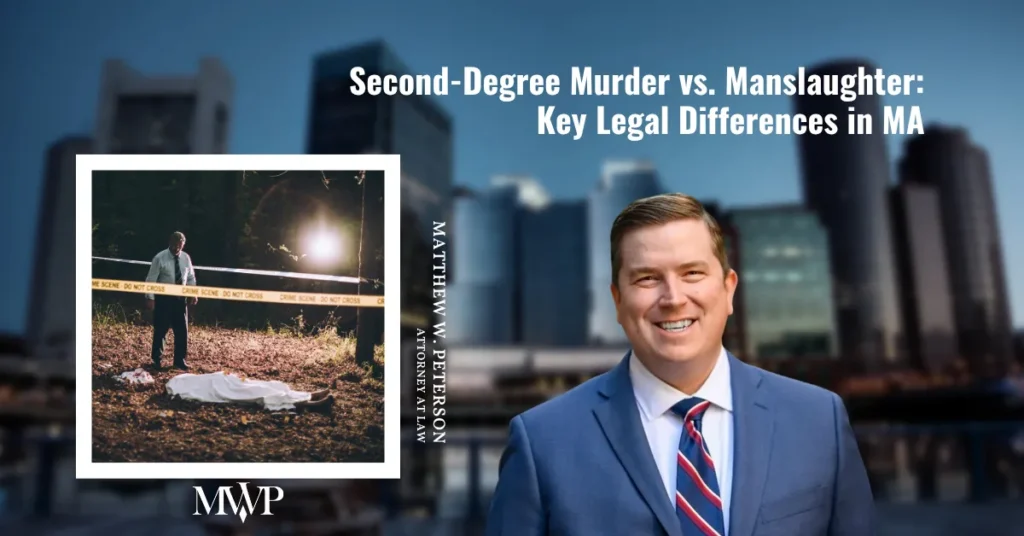In Massachusetts, there are generally three murder distinctions. Most people have heard of first-degree murder (premeditated and intentional killing), but the line gets complicated with second degree murder and manslaughter. This blog simply explains what second degree murder and manslaughter are, as well as the key distinctions on why a defendant may be charged with one or the other. However, this blog is not intended to provide legal advice. If you or a loved one is facing either of these life-altering charges, you should speak to a lawyer immediately. They will be able to more closely advise you and give more personal details.
Defining Second Degree Murder
Second degree murder is defined as an unlawful killing with “malice aforethought” but without deliberate premeditation. The key elements include:
Malice aforethought: intent to kill, cause serious bodily harm, or create a strong likelihood of death
No premeditation: killing occurs in the heat of the moment
Unlawful killing: no legal justification (like self-defense)
This charge could apply, for example, if someone killed another person in a rage. They may not have planned it beforehand, but there was a clear intent to harm or kill during the incident.
The penalty for a second degree murder conviction is life imprisonment with the possibility of parole after 15 years. Also, a second degree murder conviction in Massachusetts does not trigger an automatic appeal process like first-degree does. A defendant still has the right to appeal, but they must be the one to start that process.
What Is Manslaughter?
There are two types of manslaughter:
Voluntary manslaughter
Voluntary manslaughter is defined as unlawful killing in the heat of passion due to adequate provocation. No proof of malice aforethought is required, and mitigating circumstances reduce what would be considered murder. Some examples of voluntary manslaughter include mutual combat or excessive force in self-defense.
Involuntary manslaughter
Involuntary manslaughter is different in that it is defined as unintentional killing from reckless/wanton conduct. The key point here being that there was no intent to kill. Some examples of involuntary manslaughter are drunk driving fatalities, or drug dealing resulting in an overdose.
The penalties for a manslaughter conviction, there is more discretion than with murder so that they can differ drastically. However, generally speaking, there is a maximum of 20 years in state prison. Alternatively, a defendant could be charged up to $1000 and 2.5 years jail time. It really depends on the circumstances of each case and whether it is voluntary or involuntary.
What Are The Critical Legal Factors?
What Courts Consider:
Timing: Was it an immediate reaction or was there a reflection period
Provocation: Would a reasonable person have lost self-control?
Intent: Was there evidence of malice or was it emotional disturbance
Circumstances: Self-defense, mutual combat, etc.
Some Common Defenses Include:
Self-defense (proportional response required)
Lack of intent/malice
Mitigating circumstances
Diminished capacity
Charging decisions determine the lengths of imprisonment or other penalties, and so most legal strategies may be focused on negotiating down the charges. Mitigating circumstances can also reduce the charges from murder to manslaughter.
Conclusion
Massachusetts law recognizes different levels of moral culpability. Intent and circumstances at the time of the incident can determine which charge applies, and that determination means the difference between life imprisonment and a maximum of 20 years. These cases are complex, and you need an experienced attorney to rely on.
An attorney who is able to negotiate charges or even take the case to trial. At the Law Office of Matthew W. Peterson, we are experienced in both. We are skilled negotiators as well as aggressive trial attorneys, and we are ready to fight for you and take your case all the way. If you or a loved one are facing murder charges, call us today at 617-295-7500. The prosecution has already begun gathering evidence, don’t let them get even further ahead.
Frequently Asked Questions
Q: What's the main difference between second degree murder and manslaughter in Massachusetts?
The main difference is that second degree murder requires malice aforethought, which means the intent to kill, cause serious bodily harm, or create a strong likelihood of death. However, neither charge requires premeditation or planning.
Q: Can a second degree murder charge be reduced to manslaughter?
Yes, it can be reduced to manslaughter through plea bargaining or if mitigating circumstances are proven. Common scenarios include strong evidence of adequate provocation, questionable intent to kill, and mental health factors or diminished capacity.
Q: What are some real-world examples of when each charge would apply?
Here are some examples:
Second Degree Murder: A person comes home to discover their spouse is cheating and kills them in a rage. There is a clear intent to harm or kill (malice aforethought), but no premeditation
Voluntary Manslaughter: Two people get into a heated argument outside a bar, which turns into mutual combat (they are both physically fighting), and one kills the other. The adequate provocation (mutual fighting) and heat of passion may reduce this from murder to manslaughter
Involuntary Manslaughter: A person is driving a vehicle while drunk, and they get into a crash that results in a fatality. There was no intent to kill, but the reckless conduct (drunk driving) caused someone’s death.











